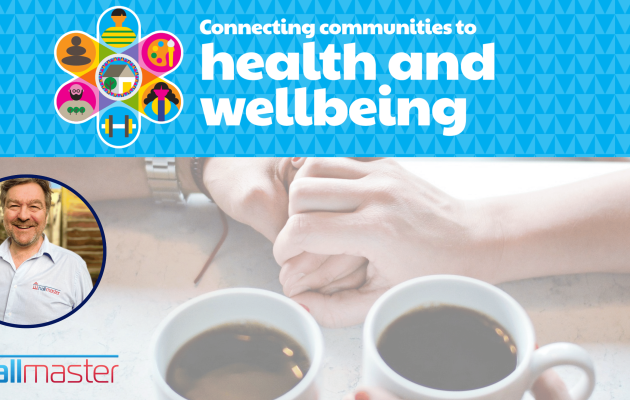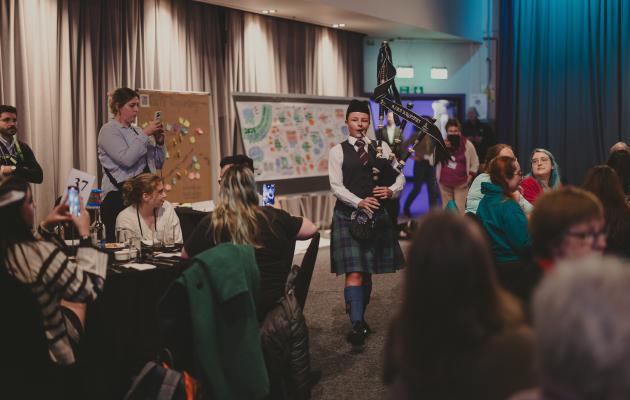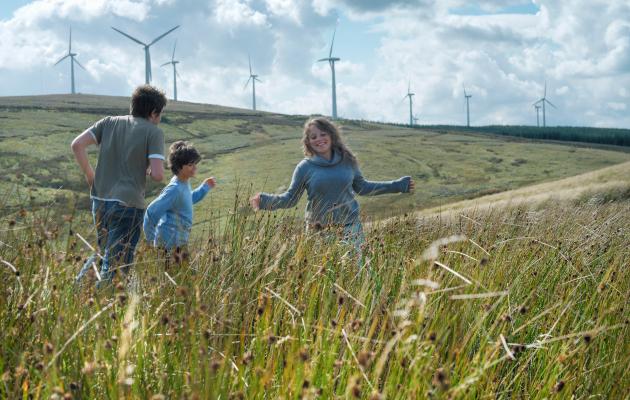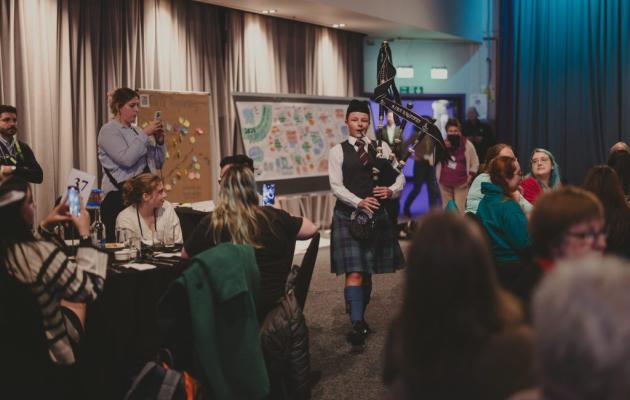
Piper at the European Rural Youth Parliament, at Thainstone Agricultural Centre. Image credit: by Rhea
Rural, not remote
In Scotland, 98% of the land is defined as rural with over 90 inhabited islands all of which is home to just 17% of the population.
Many of us attend gatherings to discuss policy, service delivery and other aspects of life and find it is often filtered through an urban lens, because that’s where the population density – dare I say voters – are living.
Rural is often profiled as being remote from ‘the centre’, at worst backward in time, needing to catch up with urban centres, whilst at best wild places of beauty to escape to, to switch off and ‘visit’. When for those of us who live and work in rural and island places, we hold the keys to the future, the front line to address climate change, food, energy and water production/ security, in short those things that sustain life.
In the Highlands of Scotland we are often subject to being called “remote”. As chair of Scottish Rural Action, I live in the Outer Hebrides, the western islands of Scotland. The ferry that links us sails to the Isle of Skye which has a bridge to mainland Scotland. Skye is famous for Màiri Mhòr nan Òran (Great Mary of the Songs, 1821-1898), a Scottish Gaelic poet who championed the cause of the crofters at the time of the Highland Land League’s campaigns.
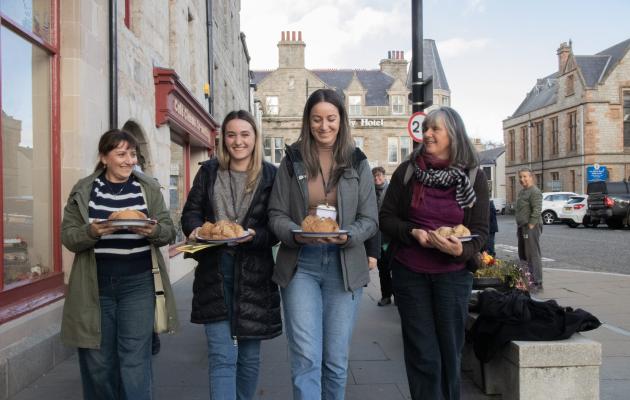
Study trip delegates in Huntly: European Rural Parliament / Scottish Rural Action
In recent times, Skye’s archivist is Catherine MacPhee who writes:
“Remote”
That word sidelines our communities, as if we exist at the edge of Scotland looking in. We are not remote – we are rural. Our islands are alive with Gaelic, with song, with tradition and story. We are rooted in place and culture, not cut off from it. To call us “remote” is to erase our strength, our resilience, and our central role in Scotland’s identity.
Naming matters. Words shape how governments act, how resources are shared, and how futures are imagined. Our culture is not peripheral – it is powerful. Our voices are not distant – they are here, loud and clear. Rural, not remote: that is who we are.
Communities are delivering on the ground
The natural assets which sustain human life may be sourced even extracted from rural areas, but they need people and communities living in rural and island places to power the production of these assets.
People from communities came to the ERP. They came in their wonderful diversity of knowledge and experience; they came with their fears, and pragmatism to discuss their challenges, share and craft the solutions. The synergy was palpable.
We were delighted to welcome in our company sole representatives from Ukraine and Georgia along with delegations from countries whose border security is in sharper focus than for others.
At this ERP, we honoured the late Michael Dower’s legacy with a special awards event recognising the achievements of individuals and communities. All the finalists were truly inspirational and illustrate the extraordinary impact locally driven initiatives have on the lives of people.
We saw the amazing work that communities are delivering on the ground. From social enterprises which address local needs – community transport, community energy, demographic changes – to local food initiatives which protect the integrity of the food and serve local communities, to women as changemakers.
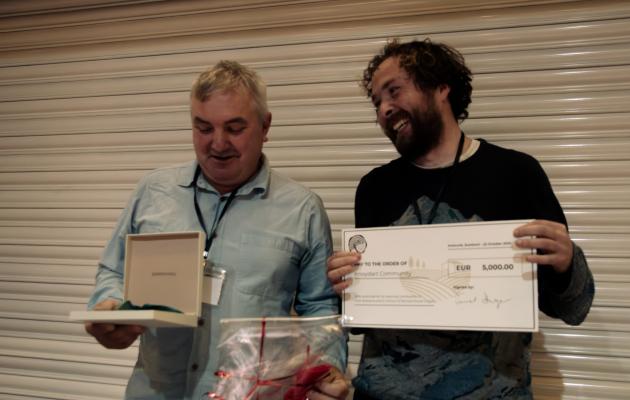
The Knoydart community, winners of the Michael Dower Award for European Rural Resilience 2025. Photo: European Rural Parliament / Scottish Rural Action
Spaces for community and culture
Despite IT connectivity, people need people, spaces which enable folk to gather – to sing, to debate, to dance, to pray, to grieve, to learn.
We did much of this at the ERP! Hosted in rural Aberdeenshire, thanks to the Aberdeenshire Council, we met in a large community campus school, Inverurie Academy.
Cultural expression was embedded in the ERP. The event couldn’t even start without a piper (bagpipes) leading the way! We were in the heart of Doric Scotland, with its distinctive Scots language rich with songs, music and stories. Feelings of love, hurt, injustice have long been carried by the working people – especially when they were singing about things that could not be written down!
Ellie Beaton, the Young Scottish Traditional Music Award winner for 2025, who comes from Aberdeenshire, entertained and informed as she taught us some local Doric songs and encouraged us to join in. There were songwriting workshops which culminated in a brand-new song created for ERP which we all heard and sang along.
We are young, we are old.
We are one and must be bold.
Learning from the past, building for the future,
we pass it on.
We are one, hear our song.
We danced to the music of a traditional ceilidh band The Haggis Chasers who ‘called’ the steps so that our European friends could fully participate in the most social and energetic dancing!
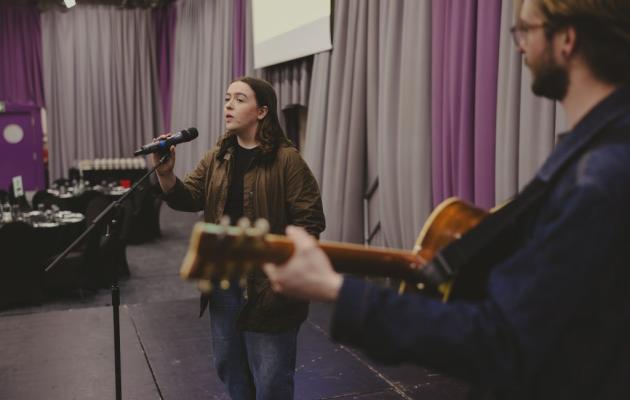
Ellie Beaton leads the delegates in song. Photo: European Rural Youth Parliament / By Rhea
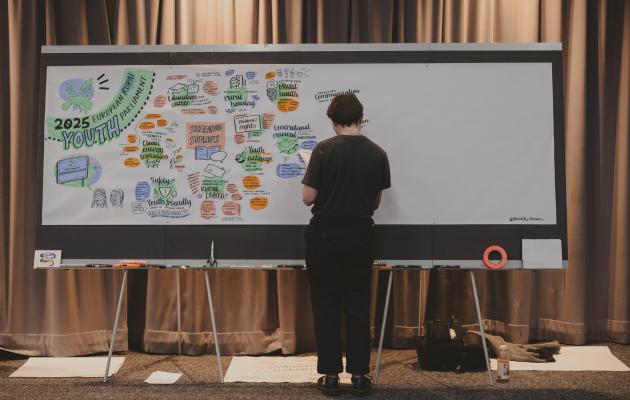
Artwork was created, particularly capturing the outputs from the European Youth Parliament. Photo: European Rural Youth Parliament / By Rhea
The planning and work to bring the ERP together was, as those who have done it before will know, a huge task. In Scotland, Scottish Rural Action worked with support from Aberdeenshire Council, whose territory held the ERP, the Scottish Government supported Scotland hosting the event every step of the way and Scotland worked with ELARD, PREPARE, ERCA and Rural Youth Europe to bring it all together.
The one thing we couldn’t plan but are very grateful for – the weather! Scotland shone, especially for when everyone was out and about on the study trips.
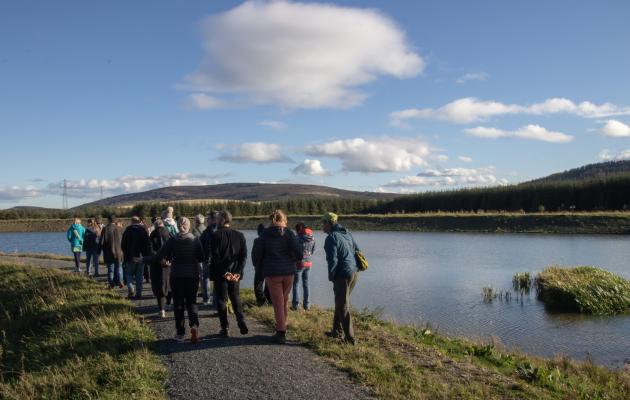
ERP study trip Photo: European Rural Parliament / Scottish Rural Action
Redefining our rurality
The key asks which emerged from all delegates at the ERP are embedded in the Inverurie Declaration. Capturing the essence of what the gathering proclaimed (through the wonders of a QR code and other IT tools) the declaration is signed by ERP steering group partners and indeed the host country’s government.
It is bold and we should all hold it up high for those who would otherwise redefine our rurality.
Rural communities know what is required; they need the support to be able to deliver what is needed to thrive, not just survive.
What is empowering about the ERP is knowing there are many shared issues and solutions across Europe. Communities are not alone. For example, if the Right to Remain is enshrined in policy, then the issues around housing, which are common across all of rural Europe, must be addressed at policy level.
The Declaration provides a reference point for rural communities, the hosts of the essential assets, to build the rationale around making the case for their sustainability.
The Inverurie Declaration will be presented to European level decision-makers in the coming months. Meanwhile, you are welcome to share it with decision-makers in your own governments and institutions, and with colleagues, partners and friends.
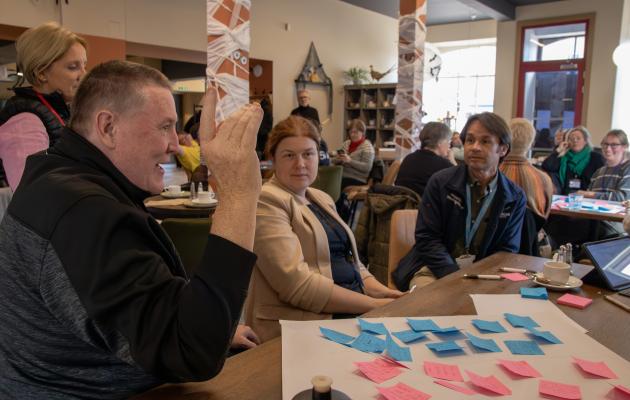
ERP delegates. Photo: European Rural Parliament / Scottish Rural Action
This blog was produced in partnership with ARC 2020 - (Agricultural and Rural Convention 2020) a multi stakeholder platform that brings together civil society networks across Europe to advocate for more sustainable & equitable agricultural & rural policies.

